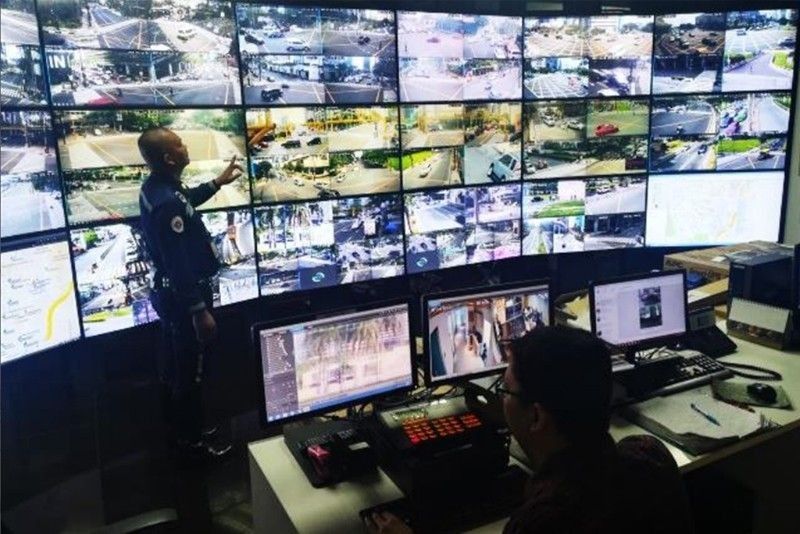Senate to probe P20 billion Chinese CCTV deal

MANILA, Philippines — The Senate is set to conduct an inquiry into the national security and fiscal implications of the P20-billion deal between the Department of the Interior and Local Governments (DILG) and a state-owned Chinese firm to put up a sophisticated surveillance system in Metro Manila and Davao City next year.
Senate President Pro Tempore Ralph Recto is set to file a resolution seeking an inquiry into the commercial contract between the DILG and China International Telecommunications and Construction Corp. (CITCC) signed last month during the first state visit of Chinese President Xi Jinping.
“Should we entrust a state-owned company with our surveillance system?” Recto said last week in an interview, referring to the “Safe Philippines” project, adding the CITCC’s supplier is Huawei Technologies, a Chinese firm blacklisted by some developed countries for alleged security and corporate violations.
“I have no problem with being closer with China, they can fund some of our infrastructure projects, as long as we get the best bang for our buck, as long as our national security will not be jeopardized,” he said.
The project is to be 85 percent funded by CITCC through a loan with 15 percent local financing.
He said numerous reports showed that Huawei products have spyware embedded in its hardware and operating systems.
Under the project, an initial 12,000 closed-circuit television cameras (CCTVs) will be installed in Metro Manila and Davao City in 30 months. The cameras will be put up at crossings, roads, public squares, business districts, science and technology parks, residential areas and stadiums, among others.
The project’s ultimate outcome is a “Safe Philippines” that guarantees citizens’ good living and social economic stability for growth, according to a briefer from CITCC, which reportedly bagged the deal.
It aims to reduce crime by at least 15 percent and improve response time by at least 24 percent.
The system includes a national command center with a back-up data center to be located in Clark, Pampanga with facial and vehicle recognition software. It will also be linked to disaster response agencies in all regions once the entire project is in place.
The senator continued last week his grilling of DILG officials, whom he chided for their apparent lack of transparency after they failed to submit what he said were the basic documents on the contract.
To Recto’s dismay, what the DILG submitted only amounted to a timeline on the implementation of the project, prompting him to warn that the Senate can reverse its approval of the agency’s 2019 budget when Congress resumes session in January if its officials would not be forthcoming on the matter.
During the deliberations on the DILG’s proposed P223-billion budget for next year, he asked for a copy of the feasibility study on the project, to which Interior Secretary Eduardo Año replied the document was with the National Economic and Development Authority (NEDA).
“But you have copies right? Why point to the NEDA?” Recto replied.
He said there are indications that point to the fact that the project was not solicited by the Philippines but pushed by CITCC during President Duterte’s visit to Beijing in 2016.
He also said it appeared that it was CITCC and Huawei that wrote the terms of reference and even the feasibility study as the DILG only had two people, including one non-technical undersecretary, that was in charge of reviewing the project.
Recto also noted the original plan included Cebu at a lower cost but ballooned to P20 billion when the initial project sites were reduced to just Metro Manila and Davao.
Funding for the project was tucked in the P96-billion Unprogrammed Funds column in the proposed P3.757-trillion national budget for 2019.
On Wednesday, the DILG said the project was bid out, with two other state-owned Chinese firms participating, namely China Machinery Engineering Corp. and a consortium of Huawei Technologies and some local firms.
The first bidder was not qualified while the consortium did not submit documents that left CITCC as the qualified company.
Recto noted Huawei is also the supplier of the two other non-qualified bidders.
Año said other countries use Huawei in their CCTV systems but Recto pointed out the country is having serious security issues in the West Philippine Sea with China.
Recto said budget for the project is nearly as big as the DILG’s proposed budget for 2019.
He said since the funding is hidden in the Unprogrammed Funds provision, the executive branch can easily allocate funding whenever it deems there is money available even when the Philippine National Police and other agencies have other more pressing needs.
He warned the terms of the loan might be disadvantageous to the country, given that it was commercial transaction.
- Latest
- Trending





























